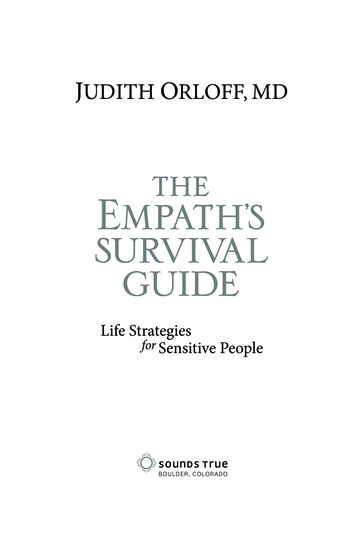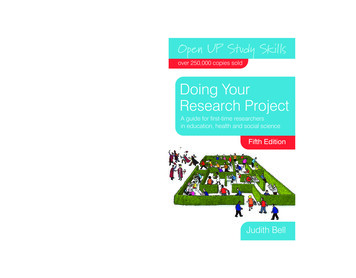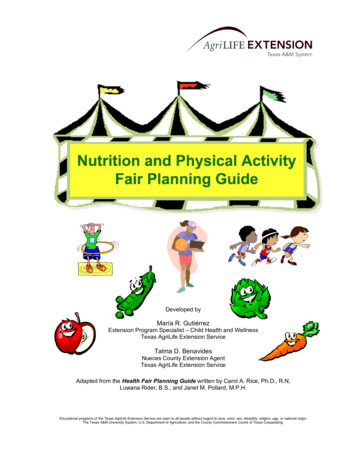
Transcription
JUDITH ORLOFF, MDLife Strategiesfor Sensitive PeopleBOULDER, COLORADO
CONTENTSCHAPTER 1Are You an Empath?Introduction to Empathy . . . 1CHAPTER 2Empaths, Emotions, and Health:How to Stop AbsorbingOther People’s Distress . . . 29CHAPTER 3Empaths and Addiction:From Alcohol to Overeating . . . 57CHAPTER 4Empaths, Love, and Sex . . . 77CHAPTER 5Protecting Yourself from Narcissistsand Other Energy Vampires . . . 107CHAPTER 6Empaths, Parenting,and Raising Sensitive Children . . . 129CHAPTER 7Empaths and Work . . . 163CHAPTER 8Empaths, Intuition,and Extraordinary Perceptions . . . 187CHAPTER 9The Gift of Being an Empath . . . 207Protection Strategies:A Quick Reference Guide . . . 215ix
CONTENTSCreating Community:Setting Up Your OwnEmpath Support Group . . . 243Acknowledgments. . . 247Notes . . . 249Selected Reading. . . 253Index . . . 255About the Authorx. . . 263
Chapter 1ARE YOU AN EMPATH?Introduction to EmpathyI’m a physician with fourteen years of conventional medicaltraining at USC and UCLA. I am also an empath. In mymedical practice of over two decades, I specialize in treatinghighly sensitive people like myself. Though there is a spectrumof sensitivity that exists in human beings, empaths are emotional sponges who absorb both the stress and joy of the world.We feel everything, often to an extreme, and have little guardup between others and ourselves. As a result, we are often overwhelmed by excessive stimulation and are prone to exhaustionand sensory overload.I’m so passionate about this topic both professionally andpersonally because I’ve had to develop specific strategies tomanage the challenges of being an empath myself. Theseallow me to protect my sensitivities so I can maximize theirbenefits — and there are so many! I want to share with you howto become a balanced, empowered, and happy empath. To thrive,you must learn ways to avoid taking on the energy, symptoms,and stress of others. I also want to educate your loved onesand peers — family, coworkers, bosses, parents, and romanticpartners — on how best to support and communicate with you.In this book, I will show you how to accomplish these goals.1
THE EMPATH’S SURVIVAL GUIDEI offer The Empath’s Survival Guide as a resource for kindredsensitive souls to find understanding and acceptance in a worldthat is often coarse, heartless, and disdainful of sensitivity. Init, I challenge the status quo and create a new normal for howto view sensitivity, wherever you are on the spectrum. There isnothing “wrong” with being sensitive. In fact, you are about todiscover what’s most “right” about yourself. Through this book,its companion audio program, Essential Tools for Empaths, andmy workshops for empaths, I want to create a community ofsupport so that you can find your tribe, be authentic, and shine.I want to support a movement of people who honor their sensitivities. Welcome to a circle of love! My message to you is oneof hope and acceptance. I encourage you to embrace your giftsand manifest your full power on the empath journey.WHAT IS AN EMPATH?Empaths have an extremely reactive neurological system. Wedon’t have the same filters that other people do to block outstimulation. As a consequence, we absorb into our own bodiesboth the positive and stressful energies around us. We are sosensitive that it’s like holding something in a hand that has fiftyfingers instead of five. We are truly super responders.Research shows that high sensitivity affects approximately 20percent of the population, though the degree of one’s sensitivitycan vary.1 Empaths have often been labeled as “overly sensitive”and told to “get a thicker skin.” As children and adults, weare shamed for our sensitivities rather than supported. We mayexperience chronic exhaustion and want to retreat from theworld because it often feels so overwhelming. But at this pointin my life, I wouldn’t give up being an empath for anything.2
ARE YOU AN EMPATH?It lets me sense the secrets of the universe and know passionbeyond my wildest dreams.However, my empathic abilities haven’t always felt thisincredible to me.GROWING UP AS AN EMPATHLike many empathic children, I never fit in. In fact, I felt likean alien on earth waiting to be transported to my real home inthe stars. I remember sitting in my front yard looking up at theuniverse and hoping that a spaceship would take me home. Iwas an only child, so I spent a lot of time by myself. I had noone to relate to who could understand my sensitivities. No oneseemed to be like me. My parents, who were both physicians — Icome from a family of twenty-five physicians — said, “Sweetheart, toughen up and get a thicker skin,” which I didn’t want oreven know how to do. I couldn’t go to crowded malls or parties.I’d walk in feeling fine and walk out exhausted, dizzy, anxious, orsuffering from some ache or pain I didn’t have before.What I didn’t know back then was that everyone has a subtleenergy field surrounding their body, a subtle radiant light thatpenetrates and extends beyond it a distance of inches or evenfeet. These fields communicate information such as emotionsand physical well-being or distress. When we are in crowdedplaces, the energy fields of others overlap with ours. I picked upall of these intense sensations, but I had absolutely no idea whatthey were or how to interpret them. I just felt anxious and tiredin crowds. And most of all, I wanted to escape.As a teenager in Los Angeles, I got heavily involved with drugsto block out my sensitivities. (I’m not recommending this toyou!) Then, with my sensitivities numbed, I could cope. I was3
THE EMPATH’S SURVIVAL GUIDEable to attend parties and hang out at shopping malls, just likemy friends, and would feel fine. What a relief that was! In mymemoir, Second Sight, I wrote about how I turned to drugs to shutoff my intuition and empathic abilities. But after a near-tragic caraccident, during which I went over a 1,500-foot cliff in TopangaCanyon at three in the morning in an Austin Mini Cooper, myparents were scared to death and sent me to a psychiatrist.Naturally, I fought my psychiatrist the whole way. But, infact, this angel in human form was the first person to help merealize that to become whole Ihad to embrace my sensitivities, not run from them. ThisIF YOU FEEL AS IF YOUwas the start of my healing andDON’T FIT INTO THISself-acceptance as an empath.WORLD, IT’S BECAUSESince I was so frightened by myYOU’RE HERE TO CREATEchildhood empathic and intuiA BETTER ONE.tive experiences, part of myAuthor Unknownevolution as a physician anda woman has been to learn toembrace these abilities. Theyare precious and deserve tobe nurtured and supported. That’s why I specialize in helpingempaths in my psychiatric practice and workshops.Yes, we empaths can flourish! Empathy is the medicine theworld needs.THE EMPATH EXPERIENCENow let’s explore in more detail the empath experience. Seeif you relate personally or have a loved one or colleague whoqualifies as an empath.4
ARE YOU AN EMPATH?First, what is the difference between ordinary empathy andbeing an empath? Ordinary empathy means our heart goes outto another person when they are going through a difficult period.It also means that we can be happy for others during their timesof joy. As an empath, however, we actually sense other people’semotions, energy, and physical symptoms in our bodies, without the usual filters that most people have. We can experienceother people’s sorrow and also their joy. We are supersensitive totheir tone of voice and body movements. We can hear what theydon’t say in words but communicate nonverbally and throughsilence. Empaths feel things first, then think, which is the opposite of how most people function in our overintellectualizedsociety. There is no membrane that separates us from the world.This makes us very different from other people who have hadtheir defenses up almost from the time they were born.Empaths share some or all of the traits of what psychologist Elaine Aron calls Highly Sensitive People, or HSPs. Thesetraits include a low threshold for stimulation, the need foralone time, sensitivity to light, sound, and smell, plus anaversion to large groups. In addition, it takes highly sensitivepeople longer to wind down after a busy day because their system’s ability to transition from high stimulation to quiet andcalm is slower. Empaths also share a highly sensitive person’slove of nature and quiet environments.Empaths, however, take the experience of the highly sensitive person further. We can sense subtle energy, which is calledshakti or prana in Eastern healing traditions, and we absorb thisenergy into our own bodies. Highly sensitive people don’t typically do that. This capacity allows us to experience the energiesaround us in extremely deep ways. Since everything is made ofsubtle energy, including emotions and physical sensations, we5
THE EMPATH’S SURVIVAL GUIDEenergetically internalize the feelings, pain, and various physical sensations of others. We often have trouble distinguishingsomeone else’s discomfort from our own. Also, some empathshave profound spiritual and intuitive experiences, which aren’tusually associated with highly sensitive people. Some empathsare even able to communicate with animals, nature, and theirinner guides. But being a highly sensitive person and an empathare not mutually exclusive: you can be both at the same time.To determine if you are an empath, see if you relate to one ormore of these types.GENERAL TYPES OF EMPATHSPhysical Empaths. You are especially attuned to other people’sphysical symptoms and tend to absorb them into your body.You also can become energized by someone’s sense of well-being.Emotional Empaths. You mainly pick up other people’semotions and can become a sponge for their feelings, bothhappy and sad.Intuitive Empaths. You experience extraordinary perceptions such as heightened intuition, telepathy, messages indreams, animal and plant communication, as well as contactwith the Other Side. The following includes the differenttypes and how they function: Telepathic Empaths receive intuitive informationabout others in present time.6
ARE YOU AN EMPATH? Precognitive Empaths have premonitions aboutthe future while awake or dreaming. Dream Empaths are avid dreamers and can receiveintuitive information from dreams that helpsothers and guides them in their own lives. Mediumship Empaths can access spirits on theOther Side. Plant Empaths can feel the needs of plants andconnect with their essence. Earth Empaths are attuned to changes in ourplanet, our solar system, and the weather. Animal Empaths can tune in to animals andcommunicate with them.Empaths have diverse and beautifully nuanced sensitivities. You may be one or more of the above types. In futurechapters, I’ll also discuss specific kinds of physical and emotional empaths, such as food empaths (who are attuned to theenergy of foods) and relationship and sexual empaths (whoare attuned to their partners’ and friends’ moods, sensuality,and physical health). As you learn to identify your special talents, you will find they can not only enrich your life but alsobe used for the good of others.7
THE EMPATH’S SURVIVAL GUIDESTYLES OF RELATING: INTROVERTEDAND EXTROVERTED EMPATHSPhysical, emotional, and intuitive empaths can have different styles of socializing and interacting with the world. Mostempaths are introverted, though some are extroverted. Otherempaths are a combination of both.Introverted empaths, like me, havea minimal tolerance for socializMANY EMPATHS DON’Ting and small talk. They tend toLIKE SMALL TALK.be quieter at gatherings and preferIT EXHAUSTS THEM.leaving early. Often they arrive inJudith Orloff, MDtheir own cars so they don’t haveto feel trapped or dependent onothers for a ride.I love my close circle of friendsand mostly stay away from big parties or gatherings. I also don’tlike small talk, and I’ve never learned to do it, which is commonfor the introverted type. I can socialize in groups for usuallytwo to three hours before I feel overstimulated. My friends allknow this about me and don’t take it personally when I excusemyself early.In contrast, extroverted empaths are more verbal and interactive when socializing and enjoy the banter with others morethan introverted empaths do. They also can stay longer in socialsituations without getting exhausted or overstimulated.HOW DOES SOMEONE BECOME AN EMPATH?Many factors can contribute. Some babies enter the worldwith more sensitivity than others — an inborn temperament.You can actually see it when they come out of the womb.8
ARE YOU AN EMPATH?They’re much more responsive to light, smells, touch, movement, temperature, and sound. Also, from what I’ve observedwith my patients and workshop participants, some sensitivitymay be genetically transmitted. Highly sensitive children cancome from mothers and fathers with the same traits. In addition, parenting plays a role. Childhood neglect or abuse canalso affect sensitivity levels for adults. A portion of empathsI’ve treated have experienced early trauma, such as emotionalor physical abuse, or were raised by alcoholic, depressed, ornarcissistic parents. This could potentially wear down the usualhealthy defenses that a child with nurturing parents develops.As a result of their upbringing, these children typically don’tfeel “seen” by their families, and they also feel invisible inthe greater world that doesn’t value sensitivity. In all cases,however, empaths haven’t learned to defend against stress inthe same way others have. We’re different in this respect. Anoxious stimulus, such as an angry person, crowds, noise, orbright light, can agitate us because our threshold for sensoryoverload is extremely low.THE SCIENCE OF EMPATHYThere are a number of scientific findings explaining the empathexperience that I find fascinating.The Mirror Neuron SystemResearchers have discovered a specialized group of brain cellsthat are responsible for compassion. These cells enable everyone to mirror emotions, to share another person’s pain, fear,or joy. Because empaths are thought to have hyperresponsivemirror neurons, we deeply resonate with other people’s feelings.9
THE EMPATH’S SURVIVAL GUIDEHow does this occur? Mirror neurons are triggered by outsideevents. For example, when our spouse gets hurt, we feel hurttoo. When our child is crying, we feel sad as well, and when ourfriend is happy, we also feel happy. In contrast, psychopaths,sociopaths, and narcissists are thought to have what sciencecalls “empathy deficient disorders” (see chapter 5). This meansthey lack the ability to feel empathy the way other people do,which may be caused by an underactive mirror neuron system.We must beware of these people because they are incapable ofunconditional love.2Electromagnetic FieldsThe second finding is based on the fact that both the brainand the heart generate electromagnetic fields. According to theHeartMath Institute, these fields transmit information aboutpeople’s thoughts and emotions. Empaths may be particularlysensitive to this input and tend to become overwhelmed byit. Similarly, we often have stronger physical and emotionalresponses to changes in the electromagnetic fields of the earthand the sun. Empaths know well that what happens to theearth and the sun affects our state of mind and energy.3Emotional ContagionThe third finding that enhances our understanding of empathsis the phenomenon of emotional contagion. Research hasshown that many people pick up the emotions of thosearound them. For instance, one crying infant will set offa wave of crying babies in a hospital ward. Or one personloudly expressing anxiety in the workplace can spread it toother workers. People commonly catch other people’s feelingsin groups. A recent article in the New York Times stated that10
THE EMPATH’S SURVIVAL GUIDE 2 I offer The Empath’s Survival Guide as a resource for kindred sensitive souls to find understanding and acceptance in a world that is often coarse, heartless, and disdainful of sensitivity. In it, I challenge the status quo and create a new normal for how to view sensitivity, wherever you are on the spectrum .










